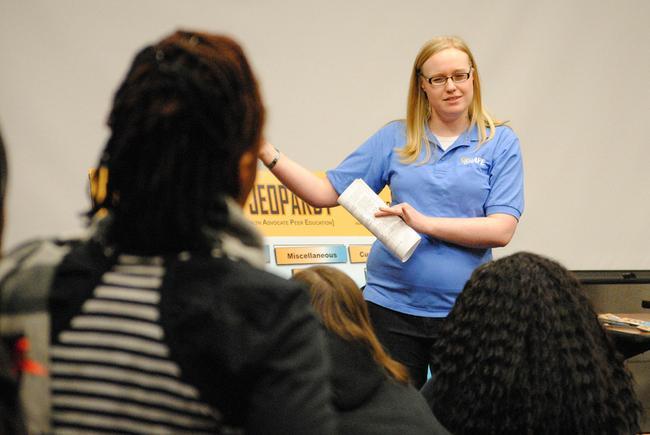Throughout the past week, the Mizzou Black Men’s Initiative has been tweeting facts about AIDS and HIV in the black community.
“Black Americans make up about 12 percent of the U.S. population, but account for half of all new AIDS cases,” a tweet from Monday read.
To combat these numbers, the men teamed up with the Chi Kappa Chapter of the Zeta Phi Beta Sorority, Inc. to host National Black HIV/AIDS Awareness Day on Monday at the Gaines/Oldham Black Culture Center.
“We wanted to do something for AIDS awareness in general so we came to MBMI to create more of a greater approach not only to females, but males also,” Zeta Phi Beta President Chanecka Williams said.
The event is one of only three scheduled awareness day events in Missouri, and the only occurring outside of St. Louis. National Awareness Day Chairman Montee Evans said there were 517 registered events across the country, many of which took place on college campuses.
“Raising awareness on a college campus becomes even more vital, because young people are just experiencing their feelings — their emotions are running wild,” Evans said. “When trying to figure out how to manage those feelings, sometimes they act on impulse and put themselves at risk having unprotected sex.”
Earlier in the day, Rain-Central Missouri, an STD prevention resource, came to the Gaines/Oldham Black Culture Center to conduct confidential AIDS and HIV testing. MBMI Coordinator Marcus Mayes said he guessed between 40 and 50 people showed up to get tested. He said AIDS and HIV testing events are something important to have on campus frequently.
“You can’t just touch on AIDS just once,” Mayes said. “You really can’t touch on it too many times.”
Later in the evening, representatives from Sexual Health Advocate Peer Education came and led the audience in a game of Jeopardy and “condom Olympics.” After, Lynn Payne spoke to the audience about her life with AIDS. She has had AIDS for over 10 years, and has children.
“As black people, we often have stigmas about talking about these things,” Williams said. “Even about health in general, it’s kind of this ‘hush’ type of thing. I think it’s important for them to hear a testimony to show that while now it is not the most deadly disease, it is still affecting people and affecting their lives.”
The night then proceeded outdoors, where the audience had a candlelight vigil to remember individuals who are battling HIV and AIDS, as well as those who have lost that battle.
“Although some of us might have less of an attachment to it, it’s still totally real,” Willams said. “You don’t want to forget that.”
The black community accounts for half of new AIDS and HIV cases, and this is exactly why spreading awareness is so integral, Mayes said.
“That statistic alone speaks volumes,” Mayes said. “This is definitely something that we’re going to be fighting for a long, long time.”






